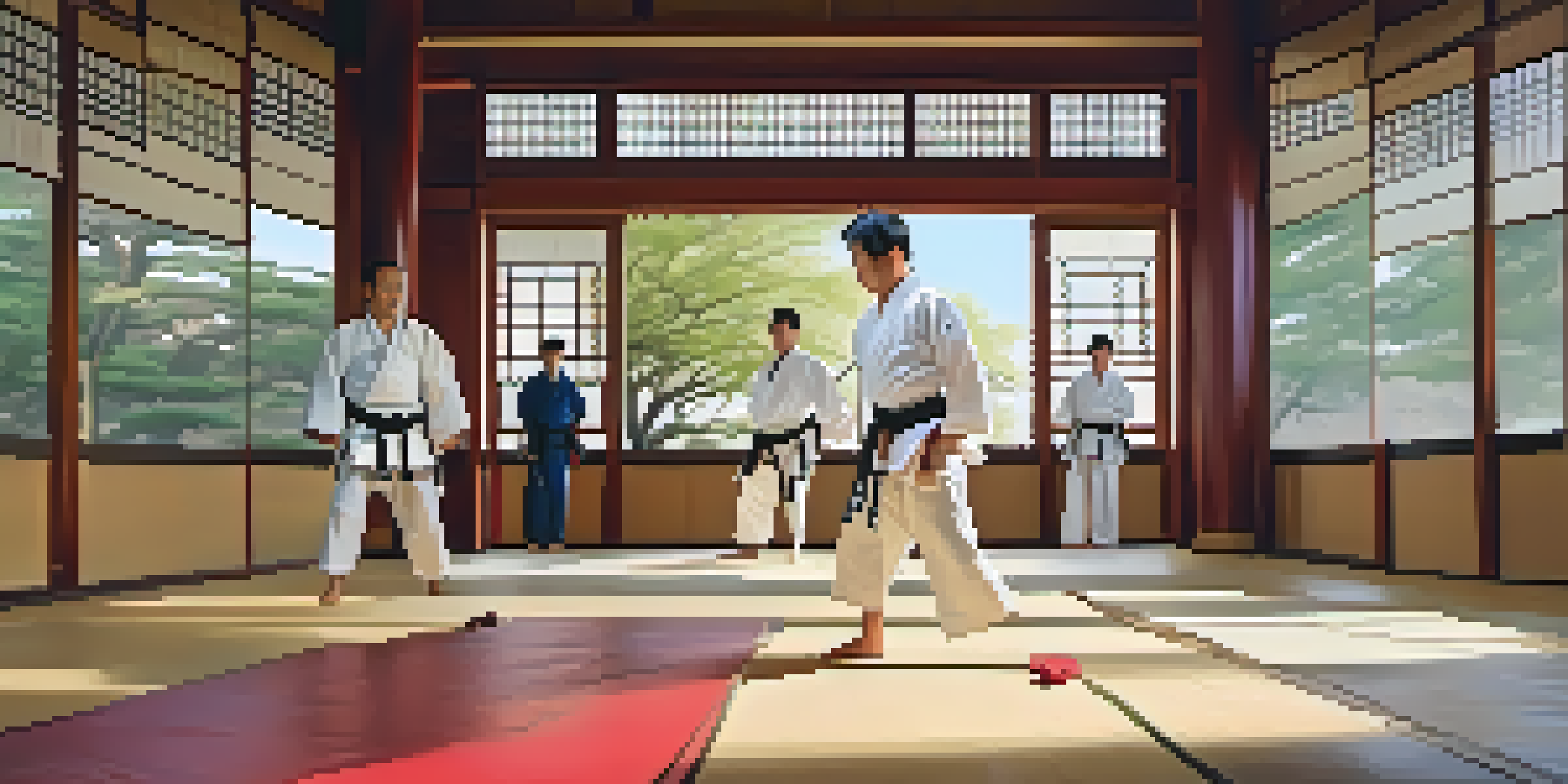Empowerment Through Martial Arts: A Mental Health Perspective

Understanding Mental Health and Empowerment
Mental health encompasses our emotional, psychological, and social well-being, influencing how we think, feel, and act. Empowerment, in this context, refers to the process of gaining control over one's life and decisions. This relationship creates a powerful synergy, where improved mental health can lead to greater personal empowerment.
The greatest glory in living lies not in never falling, but in rising every time we fall.
Martial arts offer a unique avenue for individuals to enhance their mental well-being. By engaging in physical activity, practitioners often experience reduced stress and anxiety, which can significantly improve their overall mood. This empowerment extends beyond the dojo, affecting various aspects of daily life.
Moreover, martial arts emphasize discipline, focus, and resilience. These qualities not only improve physical skills but also foster a mindset that thrives on overcoming challenges. As individuals build their capabilities, they often feel more confident and in control of their lives.
The Role of Discipline in Martial Arts
Discipline is a cornerstone of martial arts training and can significantly impact mental health. By committing to regular practice, individuals cultivate self-control and perseverance. These traits are crucial for personal growth and can lead to improved mental resilience.

As students progress through different belts, they experience tangible rewards for their dedication. This journey provides a sense of achievement that can boost self-esteem and motivate continued effort. Consequently, martial arts become a powerful tool for enhancing one's self-worth.
Mental Health Boosts Empowerment
Improved mental health enhances personal empowerment, allowing individuals to take control of their lives.
Furthermore, the discipline learned in martial arts can translate into other life areas. Whether it's managing work stress or navigating personal relationships, the ability to stay focused and committed can empower individuals to tackle challenges more effectively.
Building Confidence Through Skill Mastery
One of the most rewarding aspects of martial arts is the mastery of skills over time. Each new technique learned is a small victory that contributes to a practitioner's confidence. This gradual progression creates a sense of accomplishment that reinforces the belief in one's abilities.
What lies behind us and what lies before us are tiny matters compared to what lies within us.
As individuals become more skilled, they often develop a greater sense of self-efficacy, which is the belief in one's ability to succeed. This newfound confidence can spill over into other aspects of life, from tackling difficult tasks at work to engaging socially with peers.
Moreover, the supportive community found in martial arts classes encourages mutual respect and camaraderie. This environment fosters positive reinforcement, helping individuals feel valued and empowered as they advance in their practice.
Stress Relief and Emotional Regulation
Martial arts provide an effective outlet for stress relief, which is essential for maintaining mental health. The physical exertion involved in training releases endorphins, the body's natural mood lifters. This biochemical reaction helps alleviate feelings of anxiety and frustration.
Additionally, martial arts training encourages emotional regulation. Practitioners learn to manage their emotions through controlled breathing and mindfulness techniques, which can reduce impulsivity and improve responses to stressful situations. This skill is invaluable in everyday life.
Discipline Fuels Personal Growth
The discipline cultivated in martial arts training promotes self-control and resilience, leading to significant personal development.
As individuals become more adept at handling their emotions, they often find themselves better equipped to respond to life's challenges. This ability to maintain composure can empower them to navigate difficulties with a sense of calm and confidence.
Community and Social Support in Martial Arts
The sense of community in martial arts is a vital aspect of its mental health benefits. Training alongside others creates bonds that foster emotional support and camaraderie. This social network can be a crucial lifeline for individuals dealing with mental health challenges.
In a martial arts dojo, students often share their experiences and struggles, creating an atmosphere of understanding and empathy. This supportive environment encourages open dialogue about mental health, helping to destigmatize these conversations.
Moreover, participating in group classes cultivates a sense of belonging. When individuals feel connected to others, they are more likely to engage in positive behaviors that support their mental well-being, enhancing their overall empowerment.
Mindfulness and Focus in Martial Arts Practice
Martial arts training inherently promotes mindfulness, a practice that enhances mental clarity and focus. Whether it's through meditation or the concentration required in sparring, practitioners learn to be present in the moment. This focus can significantly reduce rumination and anxiety.
By training the mind to focus on the present, individuals often find it easier to let go of distractions and worries. This mental discipline contributes to overall well-being and can lead to improved performance in other areas of life, from academics to professional endeavors.
Community Supports Mental Well-Being
The supportive environment in martial arts fosters social connections that provide emotional support and enhance overall mental health.
Additionally, the emphasis on mindfulness in martial arts encourages a deeper understanding of oneself. As individuals become more attuned to their thoughts and feelings, they can develop healthier coping mechanisms to deal with life's inevitable ups and downs.
Empowerment and Personal Growth in Martial Arts
The journey through martial arts is not just about physical training; it's also a path of personal growth. As practitioners encounter challenges, they learn to push their limits and step outside their comfort zones. This process fosters resilience and a growth mindset.
Each obstacle faced during training—whether learning a new technique or sparring with a partner—teaches valuable life lessons. These experiences build character and help individuals realize that they are capable of overcoming adversity, which is empowering.

Ultimately, martial arts can transform how individuals view themselves and their potential. This empowerment can lead to setting and achieving personal goals, fostering a sense of purpose and direction in life.